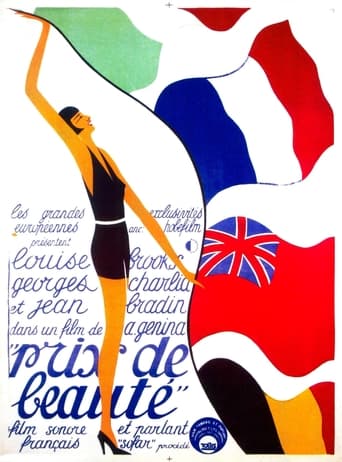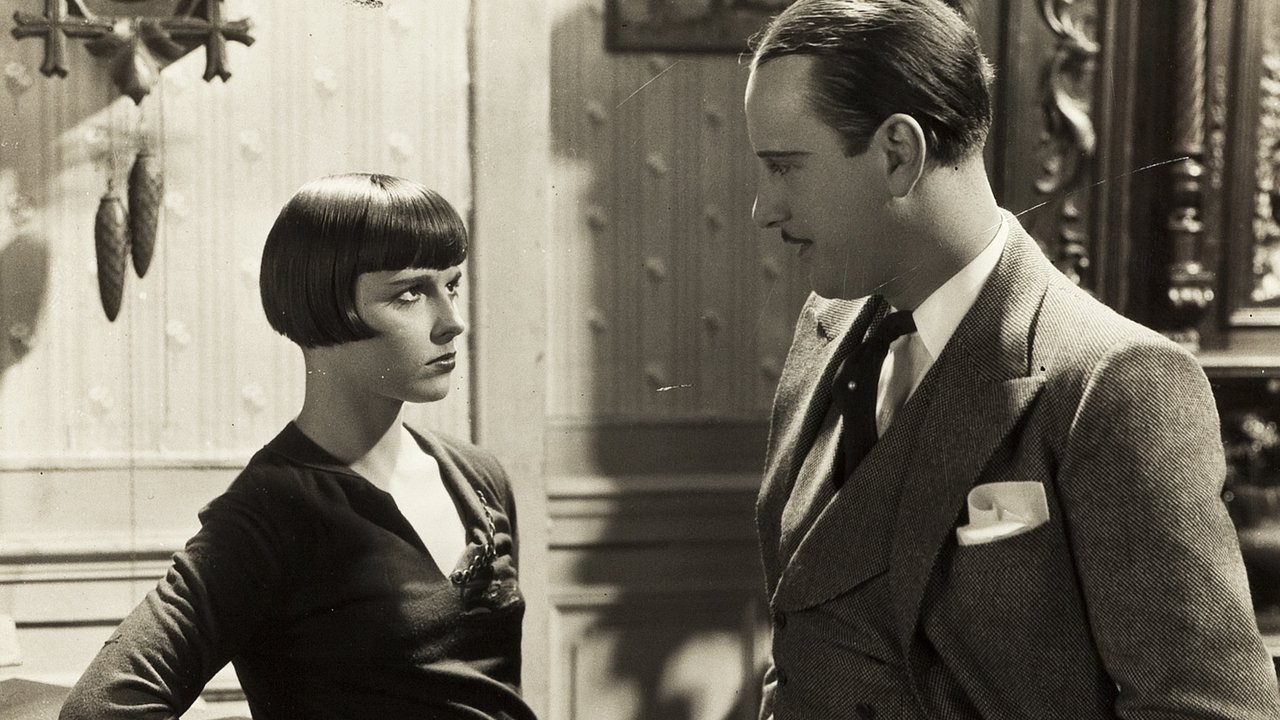zetes
A wonderful surprise! I've always heard that Louise Brooks' follow-up to her two star-making hits with G.W. Pabst was a pleasant but inconsequential swan song. I thought it was very good, with an absolutely brilliant performance by Brooks. Co-written by Pabst and Rene Clair, this is basically a silent movie with overdubbed sound. Thus, the director is able to avoid the stodginess that comes with early sound filmmaking. He uses a very intimate, fluid style with the camera drifting through crowds to discover the beautiful Ms. Brooks' face. The one big problem the film has is that Brooks' love interest (Georges Charlia) is so totally unworthy of Brooks from the start that you can never come close to sympathizing with him. But that's not that important, really. Brooks plays Charlia's fiancée. He forbids her from entering the Miss France contest, but she's already done so. When she wins the opportunity to compete for Miss Europe, she chooses to disobey him. When she wins the competition, the fame and male attention drives her back to Charlia. But poor, married life soon seems much worse to her. The film is extremely worthwhile just for the expressions of Brooks' face alone. Though she has words, as dubbed in by a French actress, she doesn't need them. Her smiles seem created by a filmmaking Leonardo, and her pains are ours. Lulu could never have survived in the talkies (and I've seen the proof, a short film she made with Roscoe Arbuckle shortly after this one), and perhaps the loss of Brooks is the greatest of the talking picture era.
Igenlode Wordsmith
We saw the silent version of this film, and it is quite simply shimmeringly beautiful. It's quite hard to see how a sound version could have been created, since it is shot with pure silent technique, long wordless sweeps of narrative without a single intertitle -- save for a few disconcerting sequences where Louise Brooks, playing a French typist, is quite visibly speaking in English... The only section that obviously cries out for sound is the final scene, where Brooks is watching the rushes for her test 'for a sound film': footage which plays constantly in the background as the action unfolds, with her mouth moving in ceaseless soundless song. I was unsurprised to learn afterwards that this passage alone in the talkie version had been hailed as an exemplar of new technique! In the sunny beauty of its opening scenes and the fairy-tale inevitability of what follows, the film resembles a dream. As a 'Louise Brooks movie' it was not at all what I was expecting, either from her Hollywood comedies or from G.W.Pabst's German melodramas: I found the idiom more fluent and enjoyable than either, and Brooks herself is a different creature, a sturdy laughing young animal rather than a shop-window vamp or manipulated doll.But what gives this film greater depth than at first appears is the unexpected second half; repelled by the rich parasites who cluster around her beauty, the pauper princess returns to a tear-stained reunion with her humbly-born true love... and the tale might very well have been ended there. Fairy-tale, however, turns to tragedy. The dilettante Grabovsky, confident in his ability to manipulate the woman he desires, is yet all too correct in his self-interested prediction -- the young lovers cannot make each other happy -- and André, ironically, was right to mistrust the social influence of beauty contests: after the intoxication of her moment's glory, Lucienne frets herself to despair over the humdrum routine of married life while her husband, in turn, is driven wild by any reminder of the whole affair. If it were a simple case of a mis-matched marriage, that would be one thing... but the true tragedy is that they do love each other.In many ways "Prix de Beauté" reminds me of Murnau's "Sunrise". But if so, the fairground and photographer scenes here would form a distorted mirror-image of the joyous reconciliation in "Sunrise"; no dream but an alienating nightmare. And the following dawn brings not a miraculous reunion but an empty bed and deserted home. Leaving a letter to say that she loves him and will always love him, Lucienne vanishes again from André's life in quest of brightness and freedom; and this time she will never come back.Gossip columns confirm all André's worst convictions, as he learns of his wife's whereabouts through reports coupling her name with Grabovsky. When the young workman penetrates at last to the lavish sanctum of the screening-room, it is with drawn gun -- to be greeted by the sight of his rival courting and caressing a laughing Lucienne, the same woman who had pledged her undying affection as she left him. He kills her, but even as he kills is transfixed by the living image on screen, Lucienne in all her transformed glory as he never saw her. The two women are juxtaposed in an endless, powerful moment, as André is seen, seized, unresisting, and pulled away: the dying girl and her singing self still projected above, caught unknowing out of time into celluloid eternity, playing on unconscious of life or death or love beneath her...The main jarring element in the film is the character of André's co-worker Antonin, who appears to serve no role throughout other than to be the licensed butt of his contemporaries' malice. He is the ugly one who can never get the girl, the ungainly wimp who is tripped and tormented in the washrooms and at work, and must take it all with an uncertain ingratiating smile in his fruitless hope for social acceptance: a typical product of the bullying of the more gifted and popular, in other words, but one the audience is apparently being invited to laugh at along with his tormentors. Unless the intention is to expose a darker side to the protagonists (for which I perceive no sign), the character seems to exist merely as comic relief, but comic relief with a distinctly nasty edge. When we know him only as an inept Peeping Tom at the waterside, it's easy to laugh, although the others' revenge seems a little over the top; when we discover that he is no chance-met stranger but André's colleague and regular sidekick, the continuing attacks rapidly cease to be very funny.But it is the images that remain. Beauty, nightmare, and dream.
nycritic
A story of obsessive love pushed to its limits and of a lovely swan whose beauty is the very ticket to her own premature demise. Placed at the beginning of talkies, PRIX DE BEAUTE walks a thin line in being a full-on silent film -- which is still is at heart -- and flirting with sound and sound effects. The effect is a little irritating for anyone coming into this film because the recorded audio is extremely tinny and just doesn't help it at all. Hearing sound stage conversation edited over the beginning sequence which takes place in a beach, for example, is as part of the movie as the actress who dubs Louise Brooks' dialog and in doing so robs the audience of a fine performance. Other than that, the movie rolls along more or less well, with little jumps in continuity here and there -- something quite common in films from this era -- and has that vague sped up feel typical of silents. In a way, this is an experiment of a movie, and closer to the style of Sergei Eisenstein in visual presentation and near-intimate closeups that elevate it from what would be a more pedestrian level. Louise Brooks here plays a character less flapper than what she was known for: she's a stenographer who on a lark decides to enter a beauty contest despite the furious opposition of her extremely smothering boyfriend. Her role is quite Thirties and contemporary for its time; the last of the flapper/Jazz Baby roles were being shown on screen and now, with the onset of female independence, women as professionals were being represented in film. That Brooks's character decides to leave her boyfriend (even if she does "reconcile" with him later) is also a little ahead of her time. However, her character's fatal flaw is its willing to believe what isn't there -- that her boyfriend wants her to succeed -- and this is what leads to her end at the movie theatre. This final sequence looks like something straight out of Hitchcock in its heightened suspense (seen in THE MAN WHO KNEW TOO MUCH) and cuts from Brooks, her image on screen, and the murderous boyfriend. Even more dramatic is the placement of the still singing "live" Brooks with the now dead one -- a chilling effect to a chilling, powerful movie.
laursene
I just saw MoMA's restored print of the silent version of Prix de Beaute. FAR better than the sound version, which is badly post-synched, shorter, and poorly paced. Bravo to the crew of restorationists who've given us back this fine film! (Trivia: The contract that Lucienne receives from the movie studio says on its letterhead, "Films, silent and talking" - an indication of how some studios were still hedging their bets in 1929-30.)Brooks' performance is very much of a piece with her work in the Pabst films, but takes it in some interesting new directions - whereas Pandora's Box and Diary of a Lost Girl are about the demimonde, Prix de Beaute is about a humble young woman's introduction to the bright, shiny new world of the media, modern technology, and the fame machine that they created.The collaboration of Pabst and Rene Clair on the screenplay is every bit as intriguing as it sounds. The first half, centering on Lucienne and her friends at the newspaper (she's a typist, her beau a linotype operator), is the Clair part - showing a fascination with recording equipment, movies, and the way the media manufactures icons. There's a sense optimism and a tremendous vigor to the life of working Paris portrayed here.The second half is the Pabst part, where everything turns dark as Lucienne's fairy tale as a beauty queen ends and she faces life as a working class housewife. She makes her escape only to have that life catch up with her. The ending is unforgettable, forcing the viewer to consider the ways that illusion and reality become confused in modern life, sometimes tragically. Clear through, the film shows a fine sense of class distinctions - how modern life can break them down and the traps they still set. Aside from Pabst's and Clair's own films, Prix de Beaute calls to mind Dreiser's novels, particularly An American Dream and Sister Carrie. Sunset Boulevard is anticipated as well. Makes one regret all the more American studios' indifference to Brooks - there was so much she could have done with any number of classic American roles.Brooks' work here is easily as good as her performances in the Pabst films, and Mate's and Nee's cinematography renders her stunning to look at. What a supremely expressive face! Too bad that this would be her last great film - not a full-blown classic, but a real gem.


 AD
AD



